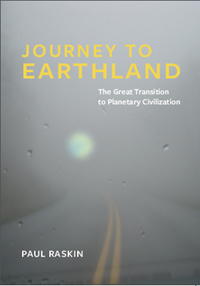Guest blog by Jon Cohn: Jon is the Managing Editor of the Great Transition Initiative. He is responsible for coordinating the on-going editorial, production, moderation, and dissemination process. The world is a failed state. The people of Earth share risks and a
common destiny without a governance system able to mute dangers and pursue
ambitions. As global crises mount, the need for a supranational basis for
policy and action becomes ever clearer. The question of world government and
how to get there—the focus of the Great Transition Initiative’s new GTI Forum,
“An
Earth Constitution: Has Its Time Come?”—deserves
a frank, thoughtful, and deep exploration.
Scholars, activists, and dreamers long have espoused the idea of a
constitutional world federation. As strands of global connectivity stretch and
thicken, the vision of a more unified world exerts a strengthening pull. How
else, one must ask, can we address the interlocking crises gestating in our
interdependent social-ecological system? How else can we advance the democratic
ideal and a resilient planet?
Lacking full legitimacy and reflecting an outdated world order,
the United Nations stands as an imperfect and incomplete facsimile of the
global political arrangements we need. For much of its history, it has been
primarily an arena for adjudicating Great Power politics. Before the UN was
established, bolder alternatives were proposed, such as the World Federalist
Movement’s call for a democratic world government to prevent war (and its root
causes), manage collective affairs, and ensure a more just global order.
The vision of a world federation faded from the spotlight but did
not disappear. Today advocates for a world commonwealth pursue divergent
strategies. Some, who believe political pragmatism demands that we build on
what we already have, devote their energies to transforming the UN. Others argue
that the UN is unreformable and instead advance designs for a new
constitutional basis for world government. Still others prioritize bottom-up
efforts to generate new political arrangements.
The Forum’s three panels reflect these different strategies. The
first, anchored by an essay by Glen T. Martin of the Earth Constitution
Institute, advances the Earth Constitution, which is perhaps the most evolved
proposal for a post-UN political order. These authors stress the urgency of
acting amidst spiraling crises and make the need for binding world law. As
the clock ticks, are gradualist strategies enough?
The second advocates alternative approaches. Some authors stake
out a path for democratic world government through reform of the United Nations
or the greater integration of democracies; others stress the need to focus on
governance, bioregions, or the practical foundation of interstate cooperation. The third spotlights inclusive processes on the path to a
democratic Earthland. The
means matter just as much as the ends, these authors argue. Indeed, success for
any new institution or governing structure depends on securing the widespread
buy-in of people who see a place for themselves in it and are ready to fight
for it.





Comments
Post a Comment